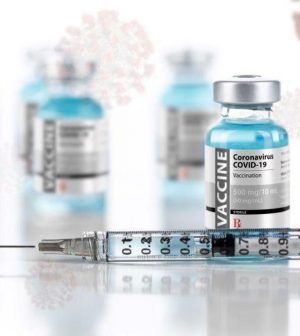- 10 Strategies to Overcome Insomnia
- Could Artificial Sweeteners Be Aging the Brain Faster?
- Techniques for Soothing Your Nervous System
- Does the Water in Your House Smell Funny? Here’s Why
- Can a Daily Dose of Apple Cider Vinegar Actually Aid Weight Loss?
- 6 Health Beverages That Can Actually Spike Your Blood Sugar
- Treatment Options for Social Anxiety Disorder
- Understanding the Connection Between Anxiety and Depression
- How Daily Prunes Can Influence Cholesterol and Inflammation
- When to Take B12 for Better Absorption and Energy
Pfizer Asks FDA to Approve Booster Shots for All U.S. Adults

As concerns mount that holiday travel and indoor gatherings will foster the spread of COVID-19, Pfizer on Tuesday asked the U.S. Food and Drug Administration to approve booster shots of its coronavirus vaccine for any American aged 18 and older.
With its application, the company included early results of a study that involved 10,000 people. That trial found the booster to be 95% effective against symptomatic infection, even as the Delta variant raged across the country, the Associated Press reported.
A median of 11 months after their last Pfizer vaccination, trial participants were given either a third vaccine dose or a dummy shot. Researchers tracked any infections that occurred at least a week later, and so far have counted five cases of symptomatic COVID-19 among booster recipients compared to 109 cases among people who got dummy shots.
Booster side effects were similar to those associated with the first two shots of the Pfizer vaccine.
Since September, only older Americans and those who are vulnerable to the virus because of underlying medical conditions or their job have been able to get a booster of the Pfizer vaccine.
“I support lowering the age on eligibility for booster doses in order to provide greater protection to the U.S. population as a whole,” said Dr. Robert Glatter, an emergency room physician at Lenox Hill Hospital in New York City. “While achieving herd immunity may still be elusive, we must also insure that asymptomatic transmission of this airborne virus is reduced as winter approaches, and we begin to move indoors in tighter spaces.”
“I believe that the initial thinking that, ‘No boosters are needed for all adults’ is undergoing a critical review by clinicians and scientists alike,” he added. “In my view, this change in thinking arose not only from clinicians’ experience taking care of patients with breakthrough cases of COVID-19, but alongside recent data demonstrating reduced vaccine effectiveness over time, especially 6-8 months after completion of the 2-shot series.”
FDA spokeswoman Alison Hunt told the AP that the agency would review Pfizer’s application “as expeditiously as possible,” but would not set a timeline for a decision. She also said the FDA hasn’t yet decided whether to convene its panel of outside experts to vet the latest data.
If the FDA authorizes Pfizer’s request for boosters for all American adults, the U.S. Centers for Disease Control and Prevention then will make recommendations on how to use them. About 194 million Americans are fully vaccinated, according to the CDC.
“While younger persons who are fully vaccinated continue to demonstrate adequate protection against severe disease, getting hospitalized and risk of dying, what’s equally important is that vaccinated persons gain increased protection against asymptomatic infections, which could result in rapid transmission to others at home, work, or in school settings,” Glatter noted.
More information
Visit the U.S. Food and Drug Administration for more on COVID vaccines.
SOURCE: Robert Glatter, MD, emergency physician, Lenox Hill Hospital, New York City; Associated Press
Source: HealthDay
Copyright © 2026 HealthDay. All rights reserved.










